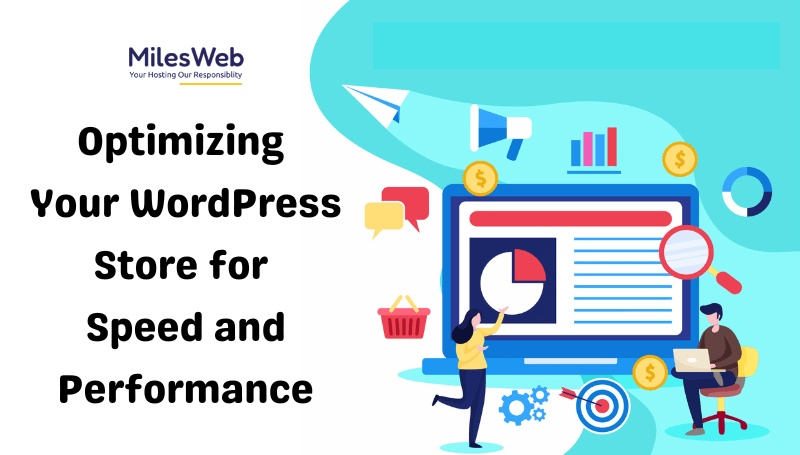
Optimizing Your WordPress Store for Speed and Performance
In the midst of rapidly advancing technological fields like eCommerce, optimizing the speed and performance of your WordPress store is very important in order to outpace the competition. Because a well-optimized WordPress store can provide a flawless user experience and also increase your SEO rankings by influencing overall WordPress web hosting cost, thus resulting in increased revenue.
Apart from your web hosting costs, you’re also required to consider other elements like Ruby on Rails hosting for greater efficiency. In this blog, we’ll be sharing some of the most effective ways to optimize the speed and performance of your WordPress store to unleash its full potential.
Tips to optimize the speed and performance of your WordPress store
Increase Your WordPress Store’s Speed
It is the most crucial measure that is used to evaluate the performance of your WordPress store website. Generally, a website gets loaded in a maximum of 3 seconds and if your website takes more time, then it is necessary to boost its loading time. You can do it by applying the following tips:
- Compress Large Images
Large-sized images are the biggest contributors to slowing down your website. Also, consider the number of images present on a single web page because it can also affect your page load time.
Often it could be alluring to showcase premium-quality images with your website visitors, but sometimes it can lead to ridiculously large file sizes, which are considerably larger than the required file sizes.
Therefore, it is important to downsize the images without compromising their quality. You can also make use of plugins like Jetpack Boost to recognize the images present on your WordPress website that need to be optimized.
- Delete Unwanted Plugins
If you own a WordPress store website with multiple plugins, then it can take more time to load compared to a website with a limited number of plugins. It happens because your website needs to process a large amount of code in order to show the web pages that your website visitors are interacting with.
Therefore, to achieve a lightweight website, make use of as handful of plugins as possible. If your website uses WordPress.com, then you’re not required to utilize the plugins for the following purposes, as their functionalities are already present by default in your web hosting plans:
- SSL certificates and safety
- Website backups
- Premium caching
- Website speed and optimization
- Management of databases
- Staging tools
- And so on
- Delete Third-Party Scripts
Your WordPress store’s loading speed can also be affected by integrating widgets and streaming videos from third-party providers such as YouTube, Vimeo, and SoundCloud. It is essential because part of your website’s content is being pulled in from these third-party sources and hence, it is important to wait for that particular service to get complete before loading your web page.
Even though it is a brief waiting time, it is usually short and delays are more apparent on the web pages that contain lots of embedded elements. However, integrating third-party embedded elements in your website is perfectly fine, but if you want to accelerate your page load times, then you must consider deleting them.
Also, to decrease the execution of third-party scripts on your website, you’re required to enable the Defer Non-Essential JavaScript option present in the plugin like the Jetpack Boost. With this plugin, you can combine JavaScript elements present on your WordPress website so as to further increase your website’s loading time.
- Speed Up CSS Loading
If you wish to improve the appearance of your WordPress website, then you can make use of the CSS language. But having said that, the size of these files could be slightly larger and even more bigger due to the plugins that consist of extra CSS elements.
It means your browser needs to process a substantial amount of data to show your website content to your visitors. Therefore, it is essential to speed up CSS loading. This involves moving crucial CSS data to the beginning of the web page through a 1-click setting and also compressing CSS to significantly decrease the website loading time as well as the number of requests.
- Select Fast-Loading Themes
A theme that you’ve used on your website manages the design and layout of your website. But a powerful WordPress hosting plan with plugins allows you to easily upload your choice of themes from different designers. But it is advisable to consider their speed. Also check out the theme’s review, active installations, latest update, and consistency.
- Regularly Update Themes and Plugins
Outdated themes and plugins can slow down your website and prevent it from adopting the most recent optimization techniques. Therefore, it is important to update your themes and plugins from time to time in order to make sure that your WordPress website loads effortlessly.
- Use WordPress Speed Measuring Tools
Using WordPress speed measuring tools, you get valuable insights into your website’s performance metrics and also get customized suggestions for improving the performance of your website.
Different WordPress speed measuring tools include:
- Google PageSpeed Insights
- Google Lighthouse
- GTmetrix
- Pingdom Tools and so on.
Conclusion
By applying the aforementioned techniques, you can develop a fast-loading website. Always keep a close eye on the changes that you make to your website by taking into account your website’s SEO ranking, overall performance, and traffic.
In the online world, where every second counts, there’s always an opportunity to optimize the speed and performance of your WordPress store. If you want more tips to speed up your website, get in touch with us today!
Let’s get in touch
Get a risk-free, no obligation proposal in 1 business day or less.
